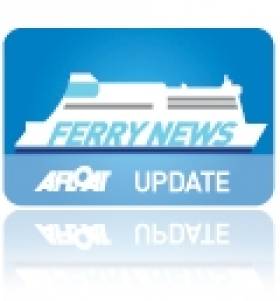Displaying items by tag: Celtic Sea ferry operator
Former Fastnet Ferry to Become Floating Hotel
#FERRY NEWS – The former Fastnet Line ferry Julia (1981 / 22,161grt) is to embark on a new life as a floating dormitory for workers building and servicing offshore wind turbines in the North Sea, according to The Examiner.
The rather ignominious end for the ferry once billed as one of the jewels in Cork tourism industry, marks the final chapter in the short and troubled life of Fastnet Line, which was set up by West Cork Tourism Co-operative.
At over 30 years-old the ship, which had capacity for 1,860 passengers, made its maiden voyage on the Cork-Swansea route in March 2010. She was bedevilled by mechanical problems in the first few days of operation, and in late 2011 the Celtic Sea service was withdrawn due to higher-than-expected fuel prices.
It had been hoped to restart the route this year, but Fastnet Line went into receivership last month. The vessel had been sold, reportedly for €5m, to C-BED, a Dutch-based company which are to rename her Wind Perfection.
For more on this story about the short-lived ferry operation click HERE.
























































